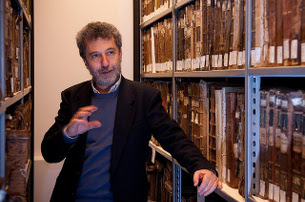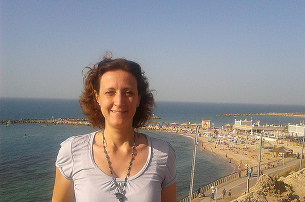Having trouble viewing this email? Click here


|
news Italian Jews Express Solidarity after Attack against Mosques in New Zealand  By Adam
Smulevich By Adam
SmulevichThe President of the Union of the Italian Jewish Communities Noemi Di Segni expressed solidarity and closeness to the Islamic community in Italy and in the world, after the horrific attacks against the mosques in Christ Church, New Zealand. "Italian Jews express their full solidarity to Muslim communities in Italy and all over the world. Our prayers go to the victims, the survivors and their families," she said in a statement released before the beginning of the Jewish Sabbath. "The attack against the two mosques in New Zealand is the dramatic demonstration that words of hatred and nostalgic expressions for extremist movements from the past know no boundaries and can be transformed into brutal violence everywhere. When any place of worship is affected by them, the whole civil society is in danger," President Di Segni then added. |
|
news "The Garden of the Righteous, a Model  By Pagine
Ebraiche staff By Pagine
Ebraiche staff“The Garden of the Righteous is a symbol of the most authentic Milan: an antifascist, pragmatic and tolerant city that was awarded the gold medal for Resistance. We have always been open to the world, we believe in democratic values”, said Milan Mayor Giuseppe Sala while opening the ceremony at the Monte Stella for the installation of four new plaques dedicated to as many new Righteous. The newly-appointed Righteous are Istvan Bibò, Simone Veil, Wangari Maathai and Denis Mukwege. Gabriele Nissim, president of Gariwo, noted that both Veil, the first female President of the European Parliament, and Bibò, a Hungarian intellectual, are “role models of commitment to the defense of human dignity and to the fight against intolerance, which is generated by those populisms and nationalisms shaking up many nations today”. *Translated by Rachele Ferin, with the help of Claudia Azzalini, students at the Advanced School for Interpreters and Translators of Trieste University, interns at the newspaper office of the Union of the Italian Jewish Communities. |
|
News Minister for Cultural Heritage Visits 
By Pagine Ebraiche staff |
|
bechol
lashon - Français Détournements 
Gadi Luzzatto Voghera* |
double life Red Dots 
By Daniela Fubini* |
|
ITALICS Jews of Venice’s Ghetto  By Yvette Alt Miller* By Yvette Alt Miller*On March 29, 1516, the Government of the city-state of Venice issued a new decree: henceforth all Jews must be confined to a small, polluted island within the city. The foul-smelling island was the former site of Venice’s foundries, or “ghettos”. The island was known as the Ghetto, and gave us this word’s meaning. Nearly a thousand Jews moved to the island. Iron gates were erected at the entrances and the Jews were forced to pay for guards to make sure no Jews escaped. Jews were allowed out only during certain daylight hours; at night the drawbridges connecting the Ghetto were raised. Jewish homes were not permitted to have windows looking outward; the only source of light for buildings in the Ghetto could be apertures facing inward towards the island. Despite these incredibly harsh rules, Jewish life flourished. Within a century, about 5,000 Jews called the Ghetto home. Unable to expand beyond the roughly seven acres that made up the Ghetto (and later, one other very small island nearby), the Jews began to build tall wooden buildings. Centuries before the invention of skyscrapers, Venice’s Jews build structures up to six stories to accommodate the thousands of residents in the overcrowded Jewish quarter. Forbidden from building synagogues, many of these tall buildings housed hidden synagogues on their top floors. Undetectable from the outside, many of these synagogues were among the most beautiful houses of worship in all of Venice, featuring ornate mosaics and woodworking, lavish paintings and exquisite gold and silver decorations. *The article was published in Aish.com on March 18, 2019. |
 |


This
newsletter is published under difficult conditions. The editors of this
newsletter are Italian journalists whose native language is Italian.
They are willing to offer their energy and their skills to give
international readers the opportunity of learning more about the
Italian Jewish world, its values, its culture and its traditions.
In spite of all our efforts to avoid this, readers may find an
occasional language mistake. We count on your understanding and on your
help and advice to correct these mistakes and improve our publication.
Pagine Ebraiche International Edition is published by the Union of
Italian Jewish Communities (UCEI). UCEI publications encourage an
understanding of the Jewish world and the debate within it. The
articles and opinions published by Pagine Ebraiche International
Edition, unless expressly stated otherwise, cannot be interpreted as
the official position of UCEI, but only as the self-expression of the
people who sign them, offering their comments to UCEI publications.
Readers who are interested in making their own contribution should
email us at desk@ucei.it
You received this newsletter because you authorized UCEI to contact
you. If you would like to remove your email address from our list, or
if you would like to subscribe using a new email address, please send a
blank email to desk@ucei.it
stating "unsubscribe" or "subscribe" in the subject field.
© UCEI - All rights reserved - The articles may only be reproduced
after obtaining the written permission of the editor-in-chief. Pagine
Ebraiche - Reg Rome Court 199/2009 – Editor in Chief: Guido Vitale.
Special thanks to: Francesco Moises Bassano, Susanna Barki, Amanda
Benjamin, Monica Bizzio, Angelica Edna Calò Livne, Eliezer Di Martino,
Alain Elkann, Dori Fleekop, Daniela Fubini, Benedetta Guetta, Sarah
Kaminski, Daniel Leisawitz, Annette Leckart, Gadi Luzzatto Voghera,
Yaakov Mascetti, Francesca Matalon, Jonathan Misrachi, Anna Momigliano,
Giovanni Montenero, Elèna Mortara, Sabina Muccigrosso, Lisa Palmieri
Billig, Jazmine Pignatello, Shirley Piperno, Giandomenico Pozzi, Daniel
Reichel, Colby Robbins, Danielle Rockman, Lindsay Shedlin,
Michael Sierra, Rachel Silvera, Adam Smulevich, Simone Somekh, Rossella
Tercatin, Ada Treves, Lauren Waldman, Sahar Zivan.
Questo notiziario è realizzato in condizioni di particolare difficoltà.
I redattori di questo notiziario sono giornalisti italiani di
madrelingua italiana. Mettono a disposizione le loro energie e le loro
competenze per raccontare in lingua inglese l'ebraismo italiano, i suoi
valori, la sua cultura e i suoi valori. Nonostante il nostro impegno il
lettore potrebbe trovare errori e imperfezioni nell'utilizzo del
linguaggio che faremo del nostro meglio per evitare. Contiamo sulla
vostra comprensione e soprattutto sul vostro aiuto e sul vostro
consiglio per correggere gli errori e migliorare.
Pagine Ebraiche International Edition è una pubblicazione edita
dall'Unione delle Comunità Ebraiche Italiane. L'UCEI sviluppa mezzi di
comunicazione che incoraggiano la conoscenza e il confronto delle
realtà ebraiche. Gli articoli e i commenti pubblicati, a meno che non
sia espressamente indicato il contrario, non possono essere intesi come
una presa di posizione ufficiale, ma solo come la autonoma espressione
delle persone che li firmano e che si sono rese gratuitamente
disponibili. Gli utenti che fossero interessati a offrire un proprio
contributo possono rivolgersi all'indirizzo desk@ucei.it
Avete ricevuto questo messaggio perché avete trasmesso a Ucei
l'autorizzazione a comunicare con voi. Se non desiderate ricevere
ulteriori comunicazioni o se volete comunicare un nuovo indirizzo
email, scrivete a: desk@ucei.it
indicando nell'oggetto del messaggio "cancella" o "modifica".
© UCEI - Tutti i diritti riservati - I testi possono essere riprodotti
solo dopo aver ottenuto l'autorizzazione scritta della Direzione.
Pagine Ebraiche International Edition - notiziario dell'ebraismo
italiano - Reg. Tribunale di Roma 199/2009 - direttore responsabile:
Guido Vitale.
Realizzato con il contributo di: Francesco Moises Bassano, Susanna
Barki, Amanda Benjamin, Monica Bizzio, Angelica Edna Calò Livne,
Eliezer Di Martino, Alain Elkann, Dori Fleekop, Daniela Fubini,
Benedetta Guetta, Sarah Kaminski, Daniel Leisawitz, Annette Leckart,
Gadi Luzzatto Voghera, Yaakov Mascetti, Francesca Matalon, Jonathan
Misrachi, Anna Momigliano, Giovanni Montenero, Elèna Mortara, Sabina
Muccigrosso, Lisa Palmieri Billig, Jazmine Pignatello, Shirley Piperno,
Giandomenico Pozzi, Daniel Reichel, Colby Robbins, Danielle
Rockman, Lindsay Shedlin, Michael Sierra, Rachel Silvera, Adam
Smulevich, Simone Somekh, Rossella Tercatin, Ada Treves, Lauren
Waldman, Sahar Zivan.